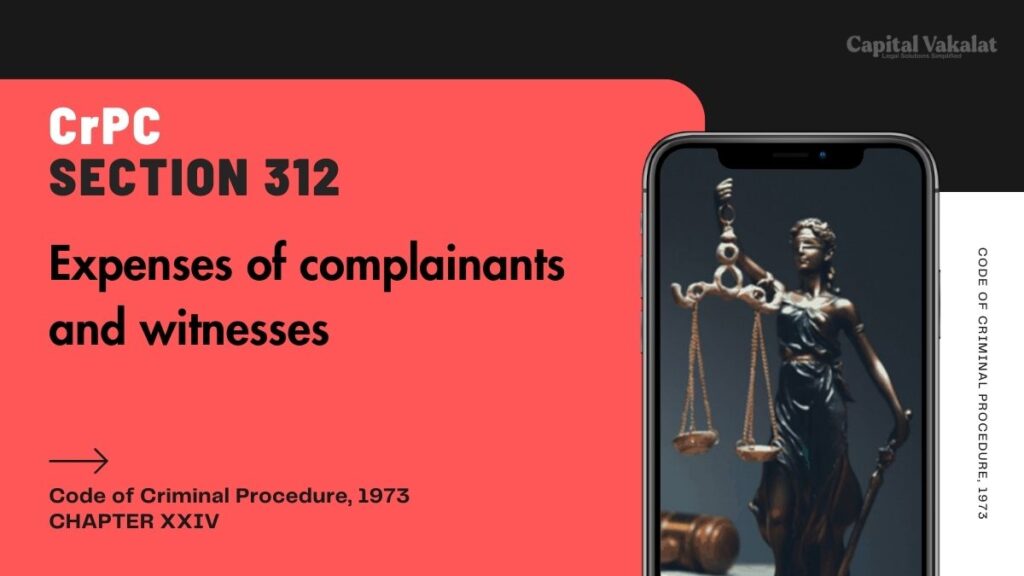In the legal framework of India, the Code of Criminal Procedure (CrPC) is a crucial statute that outlines the procedural aspects of criminal law. One of the often-discussed sections within this code is Section 312, which pertains to the expenses of complainants and witnesses.

This section ensures that individuals who come forward to testify or lodge complaints are not financially burdened. In this article, we delve into the details of Section 312 CrPC, exploring its significance, the process involved, and the expenses covered under this provision.
Bare Act. Section 312 Cr.P.C.
Expenses of complainants and witnesses.
Subject to any rules made by the State Government, any Criminal Court may, if it thinks fit, order payment, on the part of the Government, of the reasonable expenses of any complainant or witness attending for the purposes of any inquiry, trial or other proceeding before such Court under this Code.
Significance of Section 312 CrPC
Section 312 CrPC plays a pivotal role in the administration of justice. It recognizes the essential contributions of complainants and witnesses in the criminal justice system. These individuals often face various hardships, including financial constraints, which can deter them from participating in legal proceedings. By covering their expenses, Section 312 CrPC encourages active participation and ensures that justice is not hindered by financial barriers.
Who is Entitled to Expenses Under Section 312 CrPC?
Section 312 CrPC specifies that both complainants and witnesses are entitled to receive expenses. Complainants are individuals who bring forth a complaint regarding an offense, initiating legal proceedings. Witnesses, on the other hand, are individuals who provide testimony or evidence pertinent to a case. The inclusion of both groups under this section underscores the importance of their roles in the legal process.
Types of Expenses Covered
The expenses covered under Section 312 CrPC are varied and aim to alleviate the financial burden on complainants and witnesses. These typically include:
- Travel Expenses: Costs incurred for traveling to and from the court or place of examination.
- Subsistence Allowance: Daily allowances to cover basic necessities such as food and lodging during the period of their attendance in court.
- Other Incidental Expenses: This can include costs related to medical treatment if the individual is required to be present for long durations, among other miscellaneous expenses.
Process of Claiming Expenses
To claim expenses under Section 312 CrPC, complainants and witnesses must follow a specific procedure. Initially, they need to submit a formal request to the court detailing their expenses. The court then scrutinizes the request to ensure the costs are reasonable and justified. Once approved, the payment is made either directly to the individual or through the concerned police station.
Challenges Faced by Complainants and Witnesses
Despite the provision of Section 312 CrPC, complainants and witnesses often face challenges in claiming their expenses. Bureaucratic delays, lack of awareness about the provision, and sometimes even reluctance from the authorities can hinder the process. It is crucial for the judiciary and law enforcement agencies to streamline this process and ensure that the individuals entitled to these expenses receive them promptly.
Case Laws and Judicial Interpretations
Several judicial interpretations have further clarified the scope and application of Section 312 CrPC. Courts have consistently emphasized the importance of reimbursing complainants and witnesses to maintain the integrity of the legal process. Notable cases have addressed issues such as the timely disbursement of funds and the need for transparency in the approval process.
The Impact on the Criminal Justice System
The implementation of Section 312 CrPC significantly impacts the criminal justice system. By providing financial support to complainants and witnesses, it ensures their active participation, which is vital for the adjudication of cases. This section not only helps in gathering crucial evidence but also promotes a culture of accountability and fairness within the legal framework.
Conclusion
Section 312 CrPC is a testament to the Indian judiciary’s commitment to ensuring justice for all. By covering the expenses of complainants and witnesses, it removes financial barriers and encourages active participation in legal proceedings. However, for its full potential to be realized, it is imperative that the process of claiming these expenses is made more accessible and transparent. As the judiciary continues to uphold the principles of justice, the significance of Section 312 CrPC in maintaining the integrity of the legal process cannot be overstated.